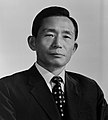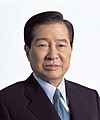
Back بوابة:كوريا الجنوبية Arabic Portal:Cənubi Koreya Azerbaijani دەروازە:کۆریای باشوور CKB Portal:Corea del Sur Spanish Portail:Corée du Sud French Portal:Korea Selatan ID Portale:Corea del Sud Italian 포털:대한민국 Korean Portal:Coreia do Sul Portuguese ද්වාරය:දකුණු කොරියාව Singhalese
 |
환영합니다! / Welcome To The South Korea Portal!  South Korea, officially the Republic of Korea (ROK), is a country in East Asia. It constitutes the southern part of the Korean Peninsula and borders North Korea along the Korean Demilitarized Zone; though it also claims the land border with China and Russia. The country's western border is formed by the Yellow Sea, while its eastern border is defined by the Sea of Japan. South Korea claims to be the sole legitimate government of the entire peninsula and adjacent islands. It has a population of 51.96 million, of which half live in the Seoul Capital Area, the ninth most populous metropolitan area in the world. Other major cities include Busan, Daegu, and Incheon. The Korean Peninsula was inhabited as early as the Lower Paleolithic period. Its first kingdom was noted in Chinese records in the early 7th century BCE. After the unification of the Three Kingdoms of Korea into Silla and Balhae in the late 7th century, Korea was ruled by the Goryeo dynasty (918–1392) and the Joseon dynasty (1392–1897). The succeeding Korean Empire (1897–1910) was annexed in 1910 into the Empire of Japan. Japanese rule ended following Japan's surrender in World War II, after which Korea was divided into two zones: a northern zone, which was occupied by the Soviet Union, and a southern zone, which was occupied by the United States. After negotiations on reunification failed, the southern zone became the Republic of Korea in August 1948, while the northern zone became the communist Democratic People's Republic of Korea the following month. In 1950, a North Korean invasion began the Korean War, which ended in 1953 after extensive fighting involving the American-led United Nations Command and the People's Volunteer Army from China with Soviet assistance. The war left 3 million Koreans dead and the economy in ruins. The authoritarian First Republic of Korea led by Syngman Rhee was overthrown in the April Revolution of 1960. However, the Second Republic failed to control the revolutionary fervor. The May 16 coup of 1961 led by Park Chung Hee put an end to the Second Republic, signaling the start of the Third Republic in 1963. South Korea's devastated economy began to soar under Park's leadership, recording the one of fastest rises in average GDP per capita. Despite lacking natural resources, the nation rapidly developed to become one of the Four Asian Tigers based on international trade and economic globalization, integrating itself within the world economy with export-oriented industrialization. The Fourth Republic was established after the October Restoration of 1972, in which Park wielded absolute power. The Yushin Constitution declared that the president could suspend basic human rights and appoint a third of the parliament. Suppression of the opposition and human rights abuse by the government became more severe in this period. Even after Park's assassination in 1979, the authoritarian rule continued in the Fifth Republic led by Chun Doo-hwan, which violently seized power by two coups and brutally suppressed the Gwangju Uprising. The June Democratic Struggle of 1987 ended authoritarian rule, forming the current Sixth Republic. The country is now considered among the most advanced democracies in continental and East Asia. (Full article...) Selected article - Joseon (Korean: 조선; Hanja: 朝鮮; MR: Chosŏn; [tɕo.sʌn]), officially Great Joseon State (대조선국; 大朝鮮國; [tɛ.tɕo.sʌn.ɡuk̚]), was a dynastic kingdom of Korea that existed for 505 years. It was founded by Taejo of Joseon in July 1392 and replaced by the Korean Empire in October 1897. The kingdom was founded following the aftermath of the overthrow of Goryeo in what is today the city of Kaesong. Early on, Korea was retitled and the capital was relocated to modern-day Seoul. The kingdom's northernmost borders were expanded to the natural boundaries at the rivers of Amnok and Tuman through the subjugation of the Jurchens. During its 500-year duration, Joseon encouraged the entrenchment of Confucian ideals and doctrines in Korean society. Neo-Confucianism was installed as the new state's ideology. Buddhism was accordingly discouraged, and occasionally Buddhists faced persecutions. Joseon consolidated its effective rule over the Korean peninsula and saw the height of classical Korean culture, trade, literature, and science and technology. In the 1590s, the kingdom was severely weakened due to the two failed Japanese invasions of 1592 and 1598. Several decades later, Joseon was invaded by the Later Jin dynasty and the Qing dynasty in 1627 and 1636–1637 respectively, leading to an increasingly harsh isolationist policy, for which the country became known as the "hermit kingdom" in Western literature. After the end of these invasions from Manchuria, Joseon experienced a nearly 200-year period of peace and prosperity, along with cultural and technological development. What power the kingdom recovered during its isolation waned as the 18th century came to a close. Faced with internal strife, power struggles, international pressure, and rebellions at home, the kingdom declined rapidly in the late 19th century. The Joseon period has left a substantial legacy to modern Korea; much of modern Korean culture, etiquette, norms, and societal attitudes toward current issues, along with the modern Korean language and its dialects, derive from the culture and traditions of Joseon. Modern Korean bureaucracy and administrative divisions were also established during the Joseon period. (Full article...)Selected image Girls' Generation (Korean: 소녀시대; RR: Sonyeo Sidae), also known as SNSD, is a South Korean girl group formed by SM Entertainment. Its nine original members were (pictured, from left to right): Taeyeon, Hyoyeon, Seohyun, Sooyoung, Yoona, Jessica, Tiffany, Sunny, and Yuri. Jessica later departed from the group in September 2014. More did you know -
In the news
This is a Good article, an article that meets a core set of high editorial standards.
Jay Park (Korean name: Park Jae-beom (Korean: 박재범; Hanja: 朴載範); born April 25, 1987) is an American rapper based in South Korea. He is a member of the Seattle-based b-boy crew Art of Movement (AOM), and founder and former CEO of the independent hip hop record labels AOMG and H1ghr Music, as well as the founder of the record label More Vision. Park returned to South Korea in June 2010 for the filming of Hype Nation, and in July, Park signed a contract with SidusHQ, one of the largest entertainment agencies in South Korea. Rebranding and re-debuting as both a solo singer and a rapper, Park has participated in the underground hip hop culture scene in South Korea, a rarity for both active and former K-Pop idols. Known for his charismatic performances and stage presence, Park has been described as a "born entertainer" by Korean pop singer Patti Kim, and The New York Times quoted the president of digital music distributor DFSB Kollective illustrating Park as "not just an artist, but also his own PR agent, fan club president, and TV network." An influential figure in the Korean hip hop scene, Park has been described as the "scene stalwart" of Korean R&B, and has been credited as one of the main figures responsible for the increased commercial acceptance and mainstream popularization of K-hip hop in South Korea. (Full article...)General images -The following are images from various South Korea-related articles on Wikipedia.
Did you know (auto-generated)
WikiProjectsSee WikiProject Korea for collaborating on South Korea topics, and more broadly, on all things Korea-related. South Korea topics
CategoriesAdministrative divisions of South Korea
Related portalsEast Asia Associated WikimediaThe following Wikimedia Foundation sister projects provide more on this subject:
Web resources
SourcesDiscover Wikipedia using portals |
© MMXXIII Rich X Search. We shall prevail. All rights reserved. Rich X Search























































